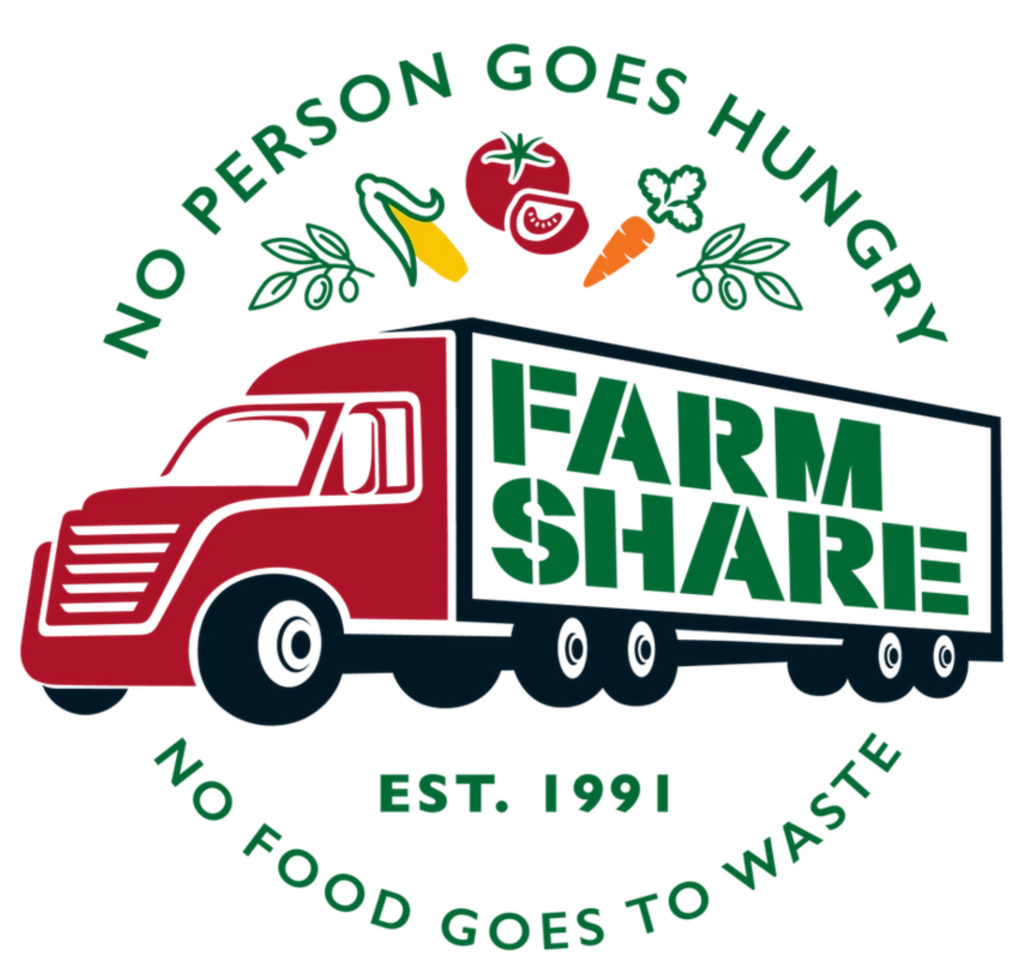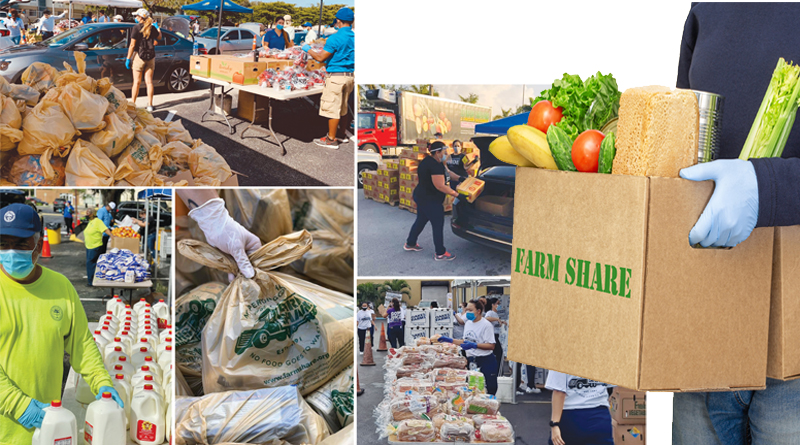Farm Share passed the test of feeding Florida in the pandemic
By: Diana Bello Aristizábal
The coronavirus pandemic has left a labor crisis at a national and local level. In Florida alone, 28,128 unemployment applications were reported during the first half of November. This situation has affected thousands of families that are still struggling to bring food home.
The good news is that amid job shortages, many businesses, restaurants, and nonprofits have delivered food to families year-round without demanding any kind of retribution and for the sole purpose of easing their burden.
Among the list of organizations and businesses that have donated food during the pandemic, one of the ones that has stood out the most is, without a doubt, Farm Share. Doral Family Journal spoke with them to find out how they overcame the challenge of feeding the residents of one of the largest states in the country in the midst of an unprecedented disaster.
The coronavirus significantly increased the demand for food
To begin, Farm Share didn’t start with the pandemic as some people think. The non-profit organization has been distributing food daily throughout Florida for 29 years.
It was founded in 1991 with the purpose of decreasing food waste in Homestead, today its headquarters. At that time, farms within the area used to turn leftovers into fertilizers for the next harvests, although most of the discarded food was in perfect condition.
Farm Share wanted to give a new use to this food, which is now being stored in four warehouses: Jacksonville, Quincy, Pompano Beach and Homestead. Today, not only fruits and vegetables are distributed among communities, but also dairy and grains as well as all the other important food groups.
But despite the organization’s long-term experience, what its founders, perhaps, never pictured is that one day they were going to face a pandemic that brought with it a shortage of all kinds of products.
“When the pandemic hit in March, from one moment to another the demand for food tripled. We had to go the extra mile to take food to every corner of the state,” says Luis Dickson, Farm Share distribution manager.
In numbers, from March to October, approximately 79 million pounds of food were distributed, while in 2019 only 60 million pounds were delivered throughout the year.
On the other hand, food delivery events also increased from 5 to 7 a week in Miami-Dade County and from 10 to 15 in the state of Florida to around 14 in the county and 30 in the state with a higher peak during November, the busiest month of the year because of Thanksgiving.
As of October 2020, 758 food deliveries have taken place in Florida, each of which has fed between 500 and 2,000 families, sometimes up to 3,000. On average, only in Miami-Dade there are 3-4 events per day.
 The demand for food increased so much with the arrival of the pandemic that during March, April, May, June and July it was common to see people camping overnight at a distribution site that would deliver food the next day.
The demand for food increased so much with the arrival of the pandemic that during March, April, May, June and July it was common to see people camping overnight at a distribution site that would deliver food the next day.
“While we were processing the system we now have to distribute food, people have realized that now they don’t have to wait so long because there are so many distributions happening that if they miss one, they can schedule another the next day,” explains Luis.
But to meet the high demand and avoid the initial collapse, the organization had to do what it would do in any other disaster scenario, such as a hurricane. “We went into disaster relief mode and followed the usual protocol in those cases,” says Luis.
Today, due to the efforts the organization has made, the demand is satisfied although it isn’t as high as it once was in those first months when thousands of cars waited in line in every event.
Being able to feed so many families is something that Luis Dickson describes as “very satisfying” because that way he can help many people go to sleep with a full stomach for a day or, maybe, for several days.
“Sometimes we think food is not essential because in most households it’s always there until one day you find yourself unemployed and realize how frustrating and serious can be not having food. In every event, there’s always someone reaching out to me to thank us for the work we do. Many people have told me that without our help they would’t have being able to eat that day,” he adds.
What’s behind each food delivery?
Meeting an entire state’s food demand in times of COVID is not an easy task because certain steps must be taken to prevent food deliveries from helping spread the virus.
For this reason, Farm Share in addition to creating a system to meet the food demand, which includes increasing the number of events across Florida, had to change the way food is distributed and delivered.
Previously, in not COVID times, people were allowed to arrive walking to take the products that were distributed at different pick up points. In this way, they were to pass through several of them to obtain an specific product until gathering all groceries.
Now, most food products are packed in the same box in order to minimize the risk of spreading the virus among the 15 to 20 volunteers who are involved in each food delivery and the recipients. They pass through fewer pick up points and do so from the comfort of their cars and with the windows up. They simply have to open their car trunks so that a volunteer can put the groceries in it.
Of course, the organization does not discriminate against those who aren’t car owners. “We always set aside a certain amount of food, that we place far from the main distribution point, for walkers. We don’t deny food to anyone nor ask for proof of income or demand meeting any requirement to provide the supplies,” states Luis.
But what happens before the cars form the lines? Food distributions are a joint effort in which several organizations and individuals are involved. They donate their time and resources without asking anything back.
A food delivery is born when an organization requests one to Farm Share that, subsequently, verifies whether said organization meets certain requirements, such as not seeking to make politics through the event and being a non-profit.
Then, the date and time of the distribution is established for which the sponsoring organization must recruit a group of volunteers and arrange the event production. In each one of them a minimum of 500 families are given food and there are 1 or 2 trucks available to convey the food.
Volunteers must arrive two hours prior to the start of the event, which begins at 9 or 10 in the morning and ends at noon or until supplies last, to make sure everything is ready at the scheduled time.
They must also stay for about an hour after the last car departures. “Without volunteers we could not do what we do, they donate their time simply because it comes from their hearts,” says Luis.
“There aren’t enough words of appreciation for them. Finding someone who is willing to help others for free is very hard. Luckily, we have always met people like that along the way.”
But not only volunteers or the sponsoring organizations should be praised. Farmers from Homestead, where an important part of the food comes from, also play an important role in this cause.
Throughout the pandemic, farms have donated a large number of vegetables from their crops, such as zucchini, tomatoes and green beans, in order to prevent them from going bad, because due to the economic crisis they didn’t have the means to pay farmers to pack the food or the drivers to haul it.
In this way, even without receiving financial compensation and having to feed their own families as well, farmers have decided to give their supplies another use while also helping thousands of families facing economic needs.
It should be noted that donations also come from packing houses, supermarkets, governments and places where legumes are imported. “We get donations from everywhere. Without them, we couldn’t feed so many people,” says Luis.
“To those who feel hopeless for the current situation, I encourage them to have faith, we are going through this together and Farm Share will never give up its mission of bringing food to every home,” he says.
To learn about future food deliveries, please visit www.farmshare.org, in the ‘events’ tab where you will find a calendar with scheduled distributions in the state.

